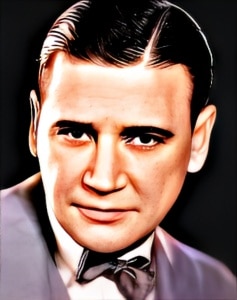 Richard Dix, born on July 18, 1893, in Saint Paul, Minnesota, was a revered American actor who left an indelible mark on early Hollywood cinema.
Richard Dix, born on July 18, 1893, in Saint Paul, Minnesota, was a revered American actor who left an indelible mark on early Hollywood cinema.
With a career that spanned from the silent era to the golden age of sound film, Dix’s talent and versatility made him a beloved figure in the world of entertainment.
Dix’s journey into the world of entertainment began on the stage, where he honed his acting skills and developed a strong presence. His transition to silent films in the early 1920s marked the beginning of a remarkable cinematic journey.
One of Richard Dix’s most iconic roles came in the silent film “Cimarron” (1931), directed by Wesley Ruggles. Dix portrayed Yancey Cravat, a fearless newspaperman who ventures into the Oklahoma Territory during the land rush. The film was an early example of a Western epic and won three Academy Awards, including Best Picture. Dix’s portrayal of Yancey Cravat earned him an Academy Award nomination for Best Actor, cementing his status as a leading man in the industry.
Dix’s on-screen presence extended beyond Westerns. He had a remarkable ability to adapt to various genres, from action and adventure to drama and romance. His performances were marked by a rugged yet charismatic quality that endeared him to audiences.
Richard Dix was also celebrated for his role in “The Ghost Ship” (1943), where he portrayed a ship’s captain caught in a web of intrigue. His ability to tackle complex and emotionally charged roles showcased his range as a performer.
In 1923, Dix played a significant role in the silent film “ Souls for Sale,” directed by Rupert Hughes. The film is a poignant portrayal of the early days of Hollywood and the dreams of aspiring actors. Dix portrayed Tom Holby, a successful silent film actor who helps a young woman, Remember Steddon (played by Eleanor Boardman), navigate the seductive yet perilous world of the movie industry. “ Souls for Sale” provided an insightful look into the glamour and challenges of the burgeoning film industry.
Throughout his career, Dix collaborated with some of Hollywood’s finest directors and actors, including legends like John Ford and Irene Dunne. His ability to establish genuine on-screen chemistry with his co-stars added depth to his performances and contributed to the success of his films.
As the film industry transitioned to the sound era, many actors faced challenges adapting to the new medium. However, Richard Dix’s rich, baritone voice and commanding presence allowed him to seamlessly make the transition. His roles in early sound films, such as “The Public Defender” (1931) and “The Conquerors” (1932), further solidified his status as a leading man of the era.
One of the highlights of Dix’s career was his involvement in “ The Ten Commandments” (1956), directed by Cecil B. DeMille. In this epic film, he played the role of Captain Pharaoh, part of the film’s modern-day story. “ The Ten Commandments” is celebrated for its grandeur and spectacle, and Dix’s participation in this classic further solidified his place in cinematic history.
Richard Dix’s career in Hollywood may have spanned a turbulent period of transition, but his impact on early cinema and his ability to capture the essence of his characters continue to be celebrated by film enthusiasts and historians. His timeless performances and versatility as an actor have secured his place in the pantheon of early Hollywood icons, making him a beloved figure in the history of American cinema. Dix’s contribution to the silent film era, as well as his successful transition to sound films, is a testament to his enduring legacy in the world of entertainment.




